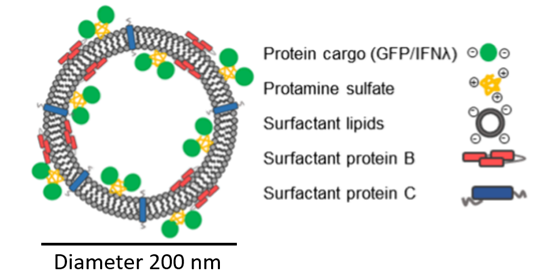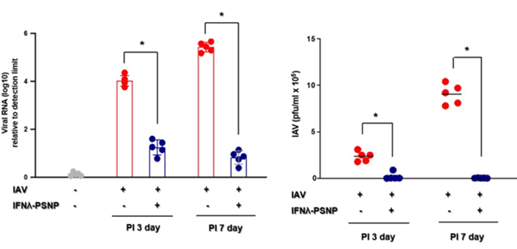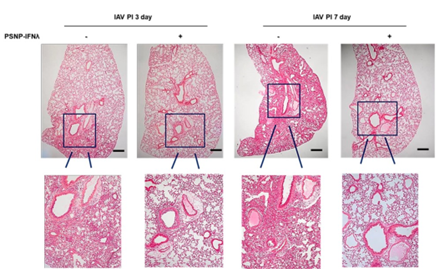SNUH-KAIST develops nanoparticle treatment to suppress influenza
- Announcement of treatment research on Inhalation Delivery of Interferon-λ-Loaded Pulmonary Surfactant Nanoparticles
- Effective infection control and pneumonia symptom relief... treatment and prevention of respiratory viral infections
Recently, a joint research team at Seoul National University Hospital and KAIST (Korea Advanced Institute of Science and Technology) developed a new respiratory treatment that can effectively suppress the spread of influenza viruses and alleviate acute pneumonia. This treatment presents an effective solution method for responding to a public health crisis and is expected to be an important turning point in the treatment and prevention of respiratory viral infections.
The research team of Professor Kim Hyun Jik of Seoul National University Hospital and Professor Park Ji-Ho and Park Su-Hyung of KAIST developed an inhalable ‘nanoparticle therapeutic agent’(IFNλ-PSNPs) that combines interferon lambda(IFN-λ) and pulmonary surfactant and announced on March 28th that they had proven through animal testing that this interferon lambda-loaded nanoparticle can induce a rapid and strong antiviral immune response in the lungs against the influenza virus.
Influenza viruses are fatal viruses that can rapidly infiltrate lung tissue through the upper respiratory tract and proliferate if not killed early. Current treatments for this virus, which often leads to severe pneumonia and group infections, include oral drugs and injections, but they are affected by drug resistance, side effects, and limitations in strengthening immunity. So the development of new forms of treatment is necessary.
To develop an inhalable treatment that is different from existing drugs, the research team combined 'interferon λ', which strengthens the antiviral immune response, with 'pulmonary surfactant', which is used to treat pulmonary dysfunction in infants and children and developed a new treatment in the form of nanoparticles (IFNλ-PSNPs). These interferon λ-loaded nanoparticles with a diameter of less than 200nm reach lung tissue directly through inhalation and can effectively treat influenza virus infection by inducing rapid virus death and strengthening the immune response in the early stages of infection.

[Figure 1] Characteristics of Interferon-λ-Loaded Pulmonary Surfactant Nanoparticles as a therapeutic agent.
Through animal model experiments, the research team verified the effectiveness of the nanoparticle treatment in suppressing influenza virus infection and improving acute pneumonia through nasal inhalation.

[Figure 2] In the nanoparticle treatment group (dark blue), the influenza virus level was significantly lowered (left graph), and antiviral effects appeared 3 days after treatment (right graph).

[Figure 3] Lung damage improved in the nanoparticle treatment group (+)
As a result, the influenza virus level was significantly lowered in the nanoparticle treatment group (IFNλ-PSNP), and the effect of suppressing viral infection was observed in the lungs from 3 days after treatment. Additionally, lung histopathology examinations showed that nanoparticle treatment significantly improved lung damage caused by the virus.
In particular, interferon λ-loaded nanoparticles showed the effect of attenuating influenza virus infections from the beginning of infection and showed a faster infection inhibition effect compared to inhalation of interferon λ alone.
Professor Kim Hyun Jik (Department of Otolaryngology) said, “This study laid an important basis for the development of influenza virus treatment by proposing a new treatment that can effectively control influenza virus infections and reduce the risk of developing pandemic infection.” He said, “By completing a new treatment model using existing drugs through collaborative research between clinicians (MDs) and natural scientists (PhDs), we will lay the foundation for rapid clinical trials in the future and provide an effective inhaled treatment for patients infected with influenza virus. We are conducting follow-up research to do so.”
The results of this research were published in the international academic journal ‘ACS Applied Materials & Interfaces’.

[Photo from left] Professor Kim Hyun Jik of the Department of Otolaryngology at SNUH, Park Ji-Ho of the Department of Bio and Brain Engineering at KAIST, and Professor Park Su-Hyung of the Graduate School of Medical Sciences.